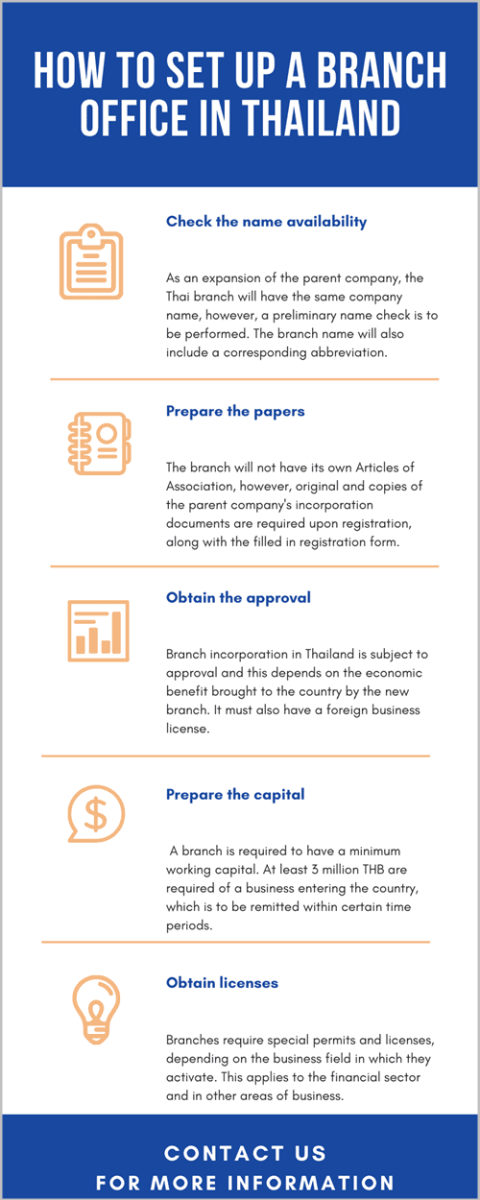The branch is an extension of the parent company and one of the ways in which foreign corporations can enter the Thai market.
A branch office is an ideal choice for multinational companies that want to develop a presence in Thailand’s business market but do not want to open a new company in Thailand.
| Quick Facts | |
|---|---|
| Applicable legislation (home country/foreign country) |
Civil, criminal, tax liability under Thai law. The branch is also subject to licensing and control laws. |
|
Best Used For |
Expanding a foreign company’s activities in Thailand and performing the exact activities as the parent company. |
| Minimum share capital (YES/NO) | Not less than 3 million baht. Minimum capital remittance conditions apply. |
| Time frame for the incorporation | 1 week |
| Management (Local/Foreign) | Locally appointed branch representative in Thailand, observing the indications of the foreign managers. |
| Legal representative required (YES/NO) |
Yes. At least one of the appointed individuals must be domiciled in Thailand. |
| Local bank account (YES/NO) |
YES |
| Independence from the parent company | NO |
| Liability of the parent company | Complete liability |
| Corporate tax rate | 20% |
| Possibility of hiring local staff (YES/NO) | YES |
| Mandatory branch name requirements | Remains the same as the parent company’s name. |
|
Branch name restrictions |
Cannot be the same as other registered company names, cannot be offensive. Other conditions can apply. |
|
Branch Memorandum and Articles of Association |
The parent company’s constitutive documents are submitted as part of the required documents. |
| Other documents | Information about the parent company’s financial status (recent accounts, and others as needed), identification documents for the Thai branch representatives, etc. |
| Special licenses |
The branch will be required to obtain a foreign business license. |
| Legal capacity |
The branch has no legal capacity in Thailand. |
| Procedural capacity |
No, a Thai branch cannot defend itself in the course of court proceedings. |
| Judicial capacity |
No |
| Minimum number of employees for the Thai branch |
There is no prescribed minimum |
| Can the representative office be used instead of the branch? | The representative office cannot be used to fully fulfil the role of the branch. In all cases, the liaison office will need special permissions and approvals before it can conduct its activities in Thailand. |
| Mandatory foreign company size |
Not applicable, however, the foreign company does need to be able to sustain the applicable minimum capital requirements for its Thai branch. |
Table of Contents
The main traits of a branch office
The list below highlights the main traits of the branch, and characteristics that set it apart from the subsidiary or the limited liability company. Investors are advised to keep these in mind when choosing to open this business form, especially the one referring to liability.
- Easy incorporation: the branch is easier to set up compared to a local company, an advantage for foreign businesses.
- Limited independence: in terms of independence, the branch is only partially independent in relation to the foreign company.
- Liability: the foreign company is liable for the debts and obligations of the Thai branch; this also extends to lawsuits brought against the branch.
- Tax: the branch is taxed at the usual corporate income tax rate but only on the profits derived from the country.
Many international companies, especially large corporations or banks, find it suitable to open a branch particularly because of the fact that they can control their Thai counterparts. Moreover, for these companies, any cost that may be associated with having to deal with the liabilities of the branch will be handled with no significant impact by the parent company. While it is not separate from the parent company, the branch will still retain a certain level of independence and will function as a permanent unit.
Although it is generally easier to incorporate as there will be no Articles of Incorporation for the branch, this permanent unit will still need to be registered with the Ministry of Commerce and obtain a Foreign Business License. Our team of agents who specialize in company registration in Thailand is able to assist foreign company representatives who are interested in starting a branch. For companies in certain industries, we can help you use a virtual office in Bangkok.
Branches in Thailand operate as per the Foreign Business Act and as per the existing limitations concerning the business fields in which legal entities can and cannot be operated by foreign nationals. One important issue to take into consideration is that for the branch, as opposed to a limited company, there is no need to bring in a Thai national who will act as a local shareholder. This is a requirement for companies in some fields and investors who are interested in opening companies other than branches should be well aware of the requirements that exist in this sense.
One of our Thai company formation specialists can give investors more details about the Foreign Business Act and the specific requirements for branches as part of our pre-incorporation counseling.
Branches can continue their operation on the market for an indefinite period or as specified by the foreign legal entity. Some foreign companies may need to do business in the country only for a limited time, or under a project-based regime, while others will be interested in establishing a permanent base in the country through which they can provide services to Thai clients. If you are interested in setting up a branch office in another country, for example in Denmark, we recommend this reliable team of corporate lawyers in Denmark.
More details about branches in Thailand
Branch offices in Thailand are treated similarly to limited companies, only there are no shareholders or directors, as it is not a registered company, but a local branch of a foreign Head Office. This type of business form has its advantages: there are no special conditions for foreign companies to register a branch office and there is no requirement to have a local shareholder. Our Thai company formation experts can give you more details on the particular characteristics of a branch office.
The branch is essentially an extension of the parent company. It must have the same business name and enter into the same types of business activities. Unlike a subsidiary, it cannot enter into other types of activities apart from those already performed by the Head Office.
The branch is a part of the parent company abroad and it is not a separate legal entity – this is the most important characteristic of the branch and the reason why it may be suited to some businesses, while others may prefer to set up a subsidiary or a separate Thai company.
For some types of branches, there is an exemption from having to apply for a Foreign Business License. These are those that provide business services under an agreement with governmental authority and those that provide services under an agreement with a state enterprise. In these cases, the foreign branch will only need to notify its operations to the Ministry of Commerce in order to obtain a registration number. When a branch falls into one of these two categories, the minimum capital will be 2 million THB.
Although foreign companies usually consider opening a branch office to be effective and low-cost, it is still required to comply with the requirements imposed by the Foreign Business Act according to the Thai laws before they can open a company in Thailand. At least one representative or appointed individual who will be in charge of the branch operations must have his domicile in Thailand.
Requirements for Thai branches in 2024
The branch operations are approved in Thailand if the foreign company is able to show that the establishment of the branch will have a direct economic benefit in the country.
The branch is treated as a permanent establishment in Thailand and there are several conditions that must be met in terms of share capital according to the period of time for which the parent company wishes to keep an operational branch in the country.
The main requirements are as follows:
- The minimum capital must be remitted in Thailand within six months when the period for which the branch will be doing business is less than three years.
- When the branch will be doing business for more than three years, at least 25% of the capital must be remitted within the first three months and half of this capital is to be remitted within the first year of the operations.
- This capital is to be converted from foreign currency to Thai Baht at the appropriate conversion rate according to the date of the transfer.
Apart from these conditions for the minimum capital, the branch must obtain a license from the Ministry of Commerce and in terms of reporting obligations, it must prepare an annual operation report.
When registering a branch, the following documents are required:
- Information about the business: a letter describing the business activities for which the branch applies for, including information about the business field, size, employees, etc.
- Copies of the parent company’s documents: the Articles of Association, the list of directors as well as any supporting documentation.
- Power of attorney: issued by the foreign company to appoint the branch representative in Thailand.
- Representative’s documents: copies of the representative’s passport or other identification documents (the ID card if he is a Thai national).
- Visa: when needed, for the foreign branch representative, a copy of the temporary visa.
- Registered office: the exact location of the branch’s registered office in Thailand (can be a map).
- Others: included here are other powers of attorney, as needed, for example in case a consultant is the one who submits the application.
Our Thailand company formation specialists can give you more details if you wish to open a branch in 2024. Our team can help foreign nationals who are interested in doing so and we can provide legal representation as needed and whenever possible (through a power of attorney).
One condition that may apply to branches operating on the Thai market, and to which investors are advised to pay attention, is that they bring a clear economic benefit and they do not compete with Thai companies. The approval of the branch, for its functioning on the market, lies with the Ministry of Commerce. If approved, the Thai branch will be required to comply not only with the requirements for the capital but also a set of other yearly requirements, such as submitting a technology transfer report and an annual operation report to the authorities.
The taxation rate for branches in Thailand is the same as for resident companies although this corporate income tax only applies to the Thai-sourced income. A branch remittance tax is imposed on the value of the profits paid to a head office after the tax has been imposed on these. The standard corporate income tax in Thailand is 20%. One of our experts in company formation matters in Thailand can give you more details about the taxation system in the country.
We invite you to watch a short video on Thai branches:
The branch compared to other business forms
Opening a branch in Thailand is not the only option for a foreign company to get started on the Thai market. Two other notable possibilities include opening a representative office or a subsidiary. In case you are interested in setting up a representative office or a subsidiary in a different country, such as Brazil, we recommend our partners – CompanyFormationBrazil.com.
Out of these options, the representative office is the one with the most limitations. It is not allowed to conduct business activities but it can be used for consultative or research purposes. For example, this office can report back to the main company about the conditions on the market, the clients, the supplies situation and other information relevant for the parent company. Once the market research is complete, the foreign company can proceed to open a branch or a subsidiary. The representative office is one business form that does not require a foreign business license due to the simple and non-economic nature of the activities conducted. However, foreign companies will be expected to provide a minimum capital requirement, according to the Foreign Business Act.
Branches are subject to annual accounting and reporting, however, they can be subject to the IFRS, the IAS, or the US GAAP, in some cases (as opposed to the Thai Accounting Standards). Understanding the accounting and audit requirements is an important part of operating a branch and our local accountants in Thailand can help answer your questions.
When choosing the appropriate type of legal structure to enter the Thai market in 2024, it is advisable to seek specialized counseling from a business consultant or a team of company registration agents. Our experts are able to answer your questions about the differences between the branch, the representative office, and the subsidiary. Once you have decided which business form suits your needs for running a business in the country, we can also assist you with the registration procedure. The language barrier can be significant for many foreign investors and our agents will handle the process on your behalf with diligence and consideration.
According to data from the Thailand Board of Investment (the Investment Promotion Summary for 2023), the total number of requests for investments in 2023 grew on a year-on-year basis. The data shows that:
- There were 2,307 projects requesting investment promotion;
- At the same time, investment promotion was effectively granted for 2,383 projects, which is an increase compared to the previous year;
- This number is a 16% increase compared to 2022;
- The total investment value was 848,318 million Baht, which is also an increase compared to the previous year.
Overall, the Board of Investment states that the country maintains an open policy, one that is welcoming to major investment projects.
If you need comprehensive information regarding the whole process of setting up a branch office in 2024, please contact our company registration consultants in Thailand for support.



